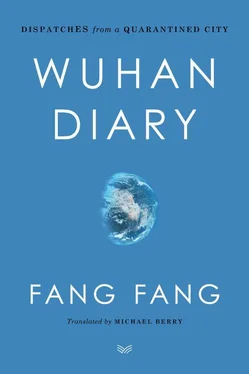Yesterday I was chatting with a few of my old schoolmates. They were telling me about what happened to Shen Huaqiang, the Secretary-General of the Wuhan-Ningbo Business Association. Two of my classmates were very close to him: H was his former supervisor and X was his classmate in college. Speaking of classmates, H and X were my classmates from elementary school all the way up through high school. I once wrote about the Ningbo businessman Shen Zhusan; Shen Huaqiang must have read that book because when he visited Wuhan with the Secretary-General of the Ningbo government, he told H that he was a big fan of mine. Shen Huaqiang wanted to meet me, so he asked H to introduce us. Shen Huaqiang was also the editor of the book Natives of Ningbo in Wuhan and he took care of a lot of the general affairs in his office. Who could have imagined that Shen Huaqiang would catch the novel coronavirus and all five members of his family would also be infected? He fell ill on the second day of the Lunar New Year and died on February 7—the same day his mother also died from the novel coronavirus. The other three people in his household were all under hospital quarantine. It is truly a tragic story. Neither Shen Huaqiang nor his mother was ever officially diagnosed with the coronavirus, so I’m afraid their deaths are not even counted in the official government tally. We kept saying we should meet so we could talk about Shen Zhusan, but we never got a chance. But I wanted to say something about this friend whom I had corresponded with numerous times but never got the chance to ever meet face-to-face.
I was talking with a classmate about all the cremations taking place and we were wondering how they are going to manage all these funerals; right after that I followed up with a professional psychologist I know about this issue. I asked her: “I’m afraid that there is still one more big obstacle ahead for the people of Wuhan. Once the outbreak is over, there will be thousands of families that will need to hold funerals. How are we going to get through this? This will be another large-scale collective trauma that people will have to face.” My psychologist friend responded: “Since all these people died at the hands of an infectious disease, the funeral homes immediately cremated all the bodies; but all the ashes will be preserved until after the outbreak. At that time, they will inform family members by telephone that they can come and pick up their relative’s remains. At that time families can make arrangements for various memorial ceremonies. But because arrangements will need to be made for thousands of deceased individuals, I suspect that the government will have to get involved to help with some of the logistics. Because part of what went wrong was due to human error, if we want people to get over their pain, they will need some kind of explanation. If there is no accountability, it will be very difficult for people to truly get past this. There are so many families that have suffered losses; but how they get through it will be up to each individual family’s network of support and their level of functionality. Disadvantaged families will need more hands-on support from the government; psychologists will not be able to provide for all the practical needs that many of these families will have.”
Another friend of mine who is well-versed in the field of psychological trauma told me: “Currently, most of the public is still in a state of psychological stress, but more serious psychological problems will start to emerge after this period of initial stress has passed. Once the outbreak has passed, we will start to see large numbers of people with post-traumatic stress disorder (PTSD). Many families suddenly lost loved ones and they were not only unable to perform their filial duty of taking care of their relatives before they died, but they were even prohibited from paying their final respects; no matter what people do, this type of trauma will always leave behind a deep scar. I suspect that there will be a very high ratio of people suffering from post-traumatic stress disorder among these surviving family members. And then there is a group of people who will suffer from traumatic reoccurrence disorder, which will cause them to replay the events that happened over and over like a nightmare they cannot wake up from. Still others will respond by going numb and shutting themselves off, and finally there will be others who will respond by becoming neurotic and overly sensitive.”
While I am hoping this outbreak will end quickly, I am at the same time terrified about the day that all those thousands of Wuhan families will have to hold funerals for their lost loved ones. I’m not sure if there are other psychologists out there who can provide other useful and practical measures that can make things even a little bit easier for these grieving families.
Today the word appearing most frequently in online chat groups is “gratitude.” The political leaders here in Wuhan have requested that the citizens provide a public expression of gratitude toward the Chinese Communist Party and the nation. Their thought process is really strange. The government is the people’s government; it exists to serve the people. Government employees are servants of the people, not the other way around. These government leaders spend all their time studying political doctrines; how could they end up getting this so backward? Professor Feng Tianyu [10] Feng Tianyu (b. 1942) is a professor at Wuhan University specializing in Chinese Cultural History. He is vice president of the Chinese Shixue Society and the author of numerous books, including Probing into Neologism, Yuehua Collection , and Outline of Chinese Cultural History .
from Wuhan University said: “As for this question of gratitude, let’s not mix up the relationship between the people and those who hold power. If you are going to take those in power as gracious benefactors who require that their people get on their knees and thank them for their benevolence, I think you had better go back and listen to what Marx said during a speech in 1875. Marx despised Ferdinand Lassalle’s notion of state supremacy and argued that: ‘the state has need, on the contrary, of a very stern education by the people’ ( Critique of the Gotha Program ).” I’m sure that all the political leaders in Hubei and Wuhan very much respect the views of Professor Feng; if this current group of new leaders are educated, I wonder if they will really hear what Professor Feng is trying to say.
That’s right, the outbreak is now basically under control and we should indeed express our gratitude for that. But it should be the government standing up to express their gratitude. The government should start off by expressing their gratitude to the families of those thousands of victims; their loved ones were the wrongful victims of a terrible scourge. They weren’t even able to say goodbye to their family members or have a proper funeral; all they could do was keep the pain inside and bottle everything up and, meanwhile, virtually no one uttered a word of complaint. The government should express their gratitude to the more than 5,000 people still lying in hospitals beds as they struggle for their lives against the god of death; it is their stubborn will to live that has slowed down the number of deaths. The government should express their gratitude to all the healthcare professionals and 40,000 angels in white who came to Wuhan from around China to save people’s lives; they worked in the face of great peril, pulling people from the grip of death, one soul at a time. The government should express their gratitude toward all those workers and laborers who hustled all over the city during the course of this outbreak; they are the ones who kept this city functioning amid the crisis. And the government should save their biggest thanks for the nine million residents of Wuhan who locked themselves in their homes, even though it meant facing all kinds of difficulties; without their cooperation this virus would never have been brought under control. No compliments or beautiful words would be considered excessive in describing the contributions that all these people made. My dear government, please suck in your pride and humbly extend your gratitude to your masters—the millions of citizens of Wuhan.
Читать дальше



![О Генри - Закупщик из Кактус-Сити [The Buyer from Cactus City]](/books/405348/o-genri-zakupchik-iz-kaktus-thumb.webp)








